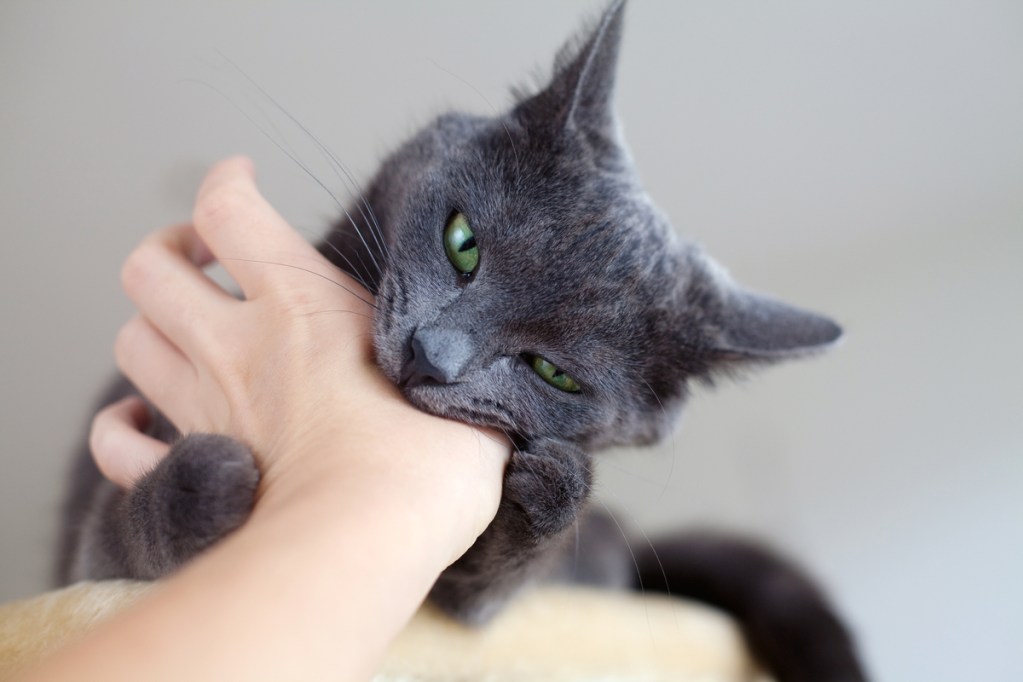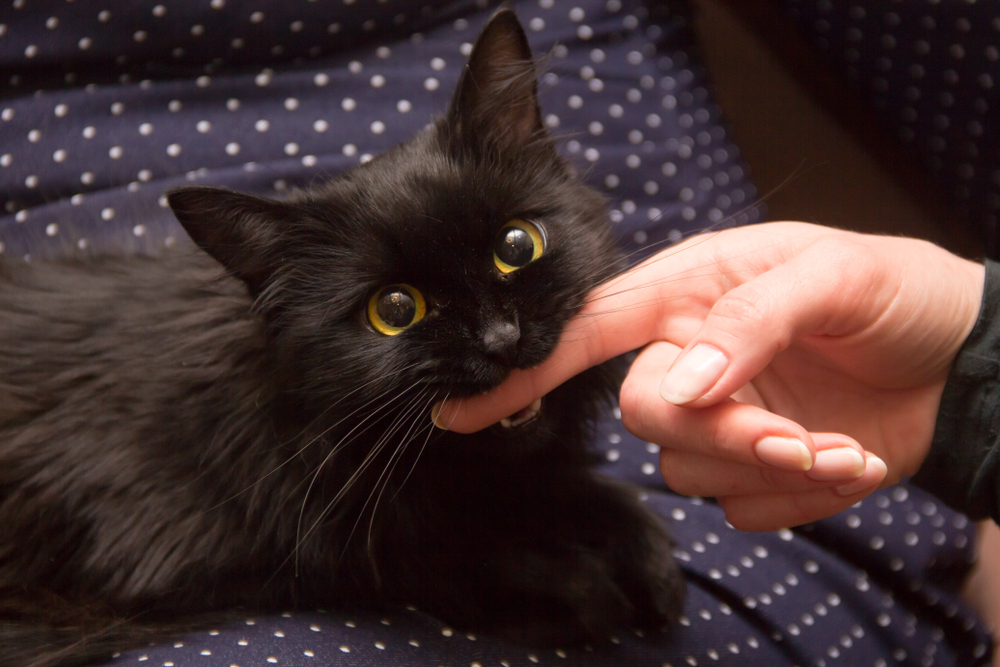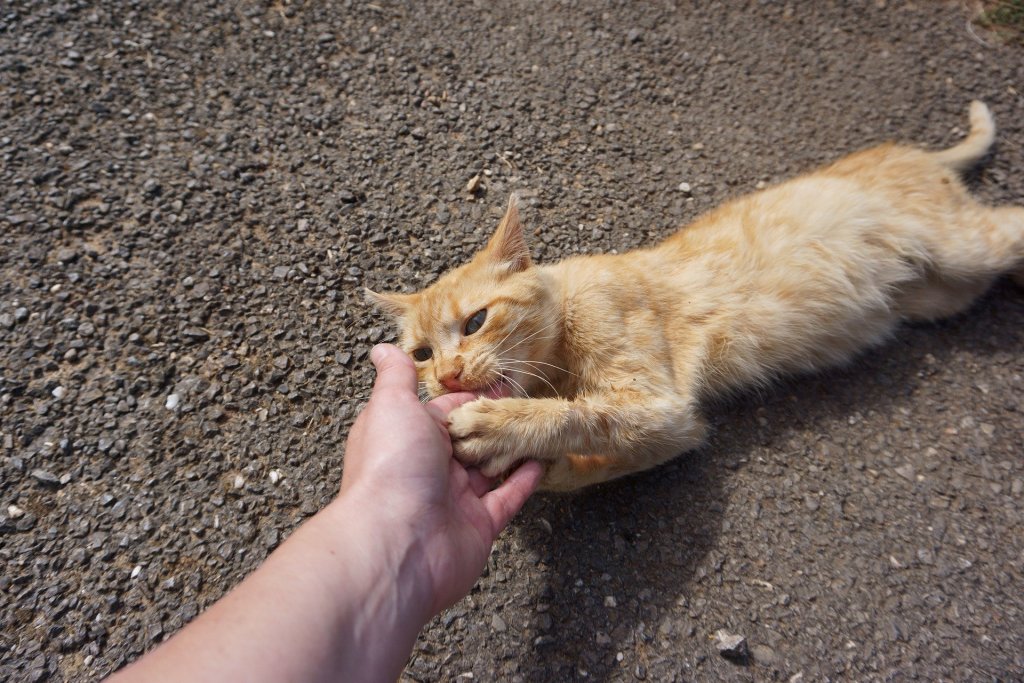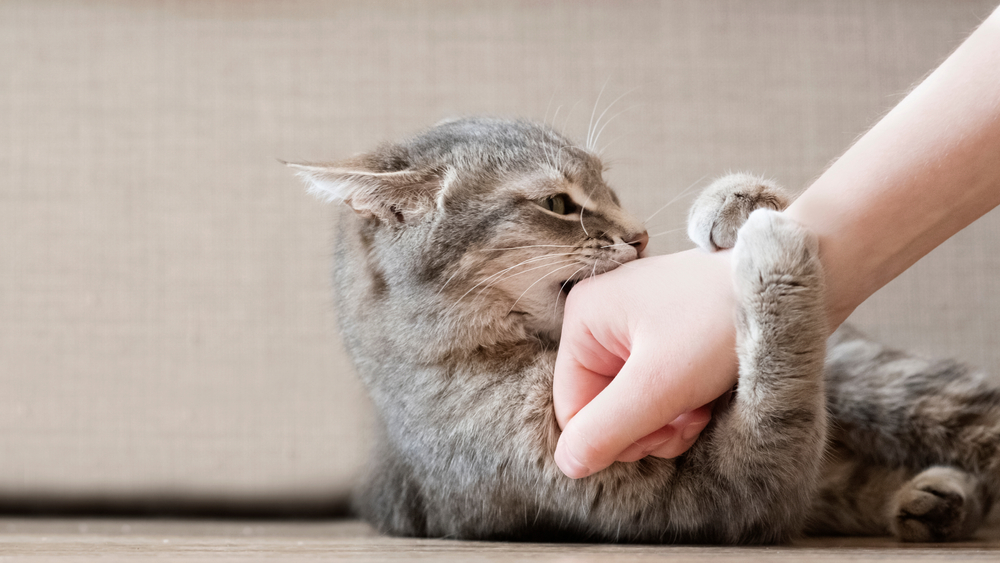If you’re lucky enough to live with a beloved feline, you know how quick cats can be. They leap from counter to counter, zoom around the apartment, and occasionally grab you and bite your hand. This behavior can be surprising and startling, and if you don’t understand what it’s about, you might be upset and frustrated.
Your cat biting your hand or arm seemingly randomly doesn’t mean that they don’t love you, and it also doesn’t mean they’re doing this just because. Instead, there are important messages behind your cat’s behavior. If you’re wondering, “Why does my cat bite me when I pet them,” — there are a few potential causes that you need to understand.

Why does my cat grab my hand and bite me?
If your cat bites you when you’re patting her, you’re witnessing something called petting-induced aggression. These bites are generally gentle and don’t draw blood, but they can still be painful and upsetting. Your cat might lick at your hand first before using their teeth. (If you see signs of aggression, your cat is telling you in no uncertain terms to back off and give them some space.)
In the case of petting-induced aggression, scientists are still trying to understand the exact cause. This biting is generally your cat’s way of telling you that they’re done with having you pat them and that you need to move away. Your cat might not enjoy being petted or may have reached the point where they’re overstimulated and need the session to end.

How should I respond when my cat bites me?
If your cat bites you, you should never react negatively. Don’t frighten or scruff her. Remember, biting is your kitty’s way of communicating with you.
Instead, respect your pet’s wishes and move away from her. Don’t attempt to keep patting and give your cat some space. They have “spoken” up loud and clear, and it’s your job to listen.

How to treat a cat bite
Sometimes your cat biting will just mean a little nip that doesn’t even leave a mark or break skin. It’s not a bad idea to wash your hands, but no further medical attention is required. However, if you wind up with an actual wound, you do need to take care of it. For starters, infections like cat scratch fever can become serious if left untreated — when your pet injects bacteria into your bloodstream you might need antibiotics.
Start by cleaning your injury and trying to get anything unpleasant out. Even though it seems counterintuitive, you should squeeze your cut so the blood helps clean the area. Then add antibiotic ointment and bandage it. Do give your doctor a call, especially if you spot any signs of infection like redness, swelling, pus, or excessive pain.

How do I get my cat to stop biting when petting?
Getting your cat to stop biting you is a matter of modifying how you pet them and learning to watch for signs that they’re becoming overstimulated.
Make an appointment with the vet
To start, it’s a good idea to take your cat to the vet for an examination to make sure they aren’t experiencing pain anywhere that’s prompting them to bite. This could be anything from a skin infection to a stomachache, so rule these out first.
Look for telltale warning signs
Next, learn to watch for your cat’s warning signs that tell you they’re getting uncomfortable. Your feline might pull their ears back or start to twitch their tail. You might notice that your cat’s pupils dilate, and their body may get stiff all over. Some cats even growl and start to expose their claws. If you notice any of these indicators, it’s important to honor your cat’s wishes and stop patting them. If they are on your lap, move them off to give them some space.
Try patting your cat a different way
You may also need to modify how you pet your cat. Some cats like short strokes as opposed to long, drawn-out strokes, and some cats like you to only pat certain areas of their bodies, like under the chin. Experiment with using different strokes, and instead of using your whole hand, see if your cat better tolerates just a finger or two. If your kitty doesn’t bite you during a patting session, consider rewarding them with a treat to reinforce this positive behavior.
Keep track of your cat’s behavior
Once you’ve learned the warning signs, you can watch to see when these signs appear. Keep track of how long you’re able to pat your cat before they give you a warning. Some can only take so much patting, so if you’re able to determine that your cat can tolerate a certain amount, you can keep this in mind so you can stop before they get uncomfortable.
Understand your cat might just not like to be touched
Finally, realize that cats can be particular. Even some very social furry friends just don’t appreciate being patted. If you try all the above strategies with no improvement, then it’s probably time to honor your cat’s wishes and not pat them. You can show them affection in other ways, such as by playing or just spending time nearby.
If your cat keeps biting you when you pat them, they’re trying to tell you something. By taking the time to listen and try to figure out the cause of this behavior, you’ll be doing right by your cat and helping to ensure they’re able to be comfortable in their home.
Editors' Recommendations
- Wondering why cats chirp? Fascinating reasons why your cat chirps at birds (and you)
- How to cat-proof your balcony before the unthinkable happens
- There’s a totally normal reason cats throw up after eating grass – here’s why
- When can kittens leave their mom? Don’t separate them too early
- When do kittens’ eyes change colors? The answer is so cool – here’s what to know


